Every year the focus is on the first round of the NHL Draft. It makes sense since most of the players selected will see time in the NHL. In subsequent rounds, fewer players make the full-time jump to the NHL, but there have been many hidden gems in the past. Daniel Alfredsson was famously drafted 133rd overall before he went on to have a Hall of Fame career and was named captain of the Ottawa Senators. While others discuss who is going to be picked in the first round, here’s a look at who could be the hidden wonders later on.
Round 3 – Pick 72
Vinzenz Rohrer
With the 72nd pick, one player who might be available is Austrian winger Vinzenz Rohrer. He’s ranked in a variety of positions with no clear consensus, projected to go as high as 59th and as low as 126th. Rohrer is a lanky winger who could add a few pounds to his 5-foot-11, 168-pound frame.
Last season, Rohrer played with the Ottawa 67’s of the Ontario Hockey League (OHL), where he scored 25 goals and 23 assists in 64 games, so he’s no stranger to the Senators‘ management team. These aren’t incredible numbers, but he was also relied on heavily on defense. Rohrer isn’t there yet but has the baseline toolkit to become a strong middle-six player.
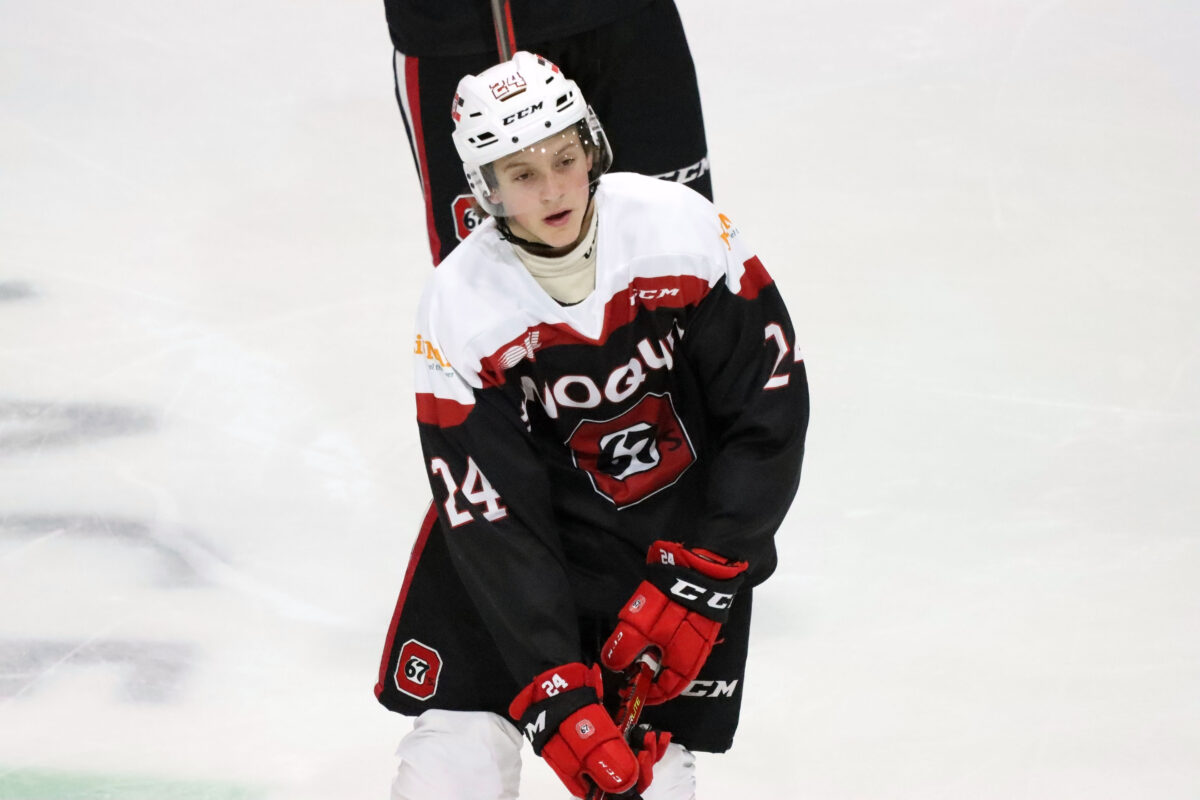
Rohrer’s game is one of high energy, whose motor is always running, and finds himself driving play from the wing on zone entries. He can struggle to make the initial pass in the offensive zone, but when the play is set up, he consistently buzzes around the ice looking to get open. When the puck is on his stick, he can struggle with trying to force a play instead of making the safe choice. In the defensive end, he tracks his opponents well but does have a tendency to chase a little bit too much.
Gavin Hayes
Another pick without a clear consensus is Gavin Hayes. He played with the Flint Firebirds of the OHL this season. He is a strong forechecker with decent footspeed and is unafraid of playing physical. He finishes his checks and will fight for his space behind the net and in the slot. The Senators love drafting “hard-nosed” players, so there’s a case for them using this pick on him. Compared to other players with a similar ranking, Hayes passes the eye test on his skating and scoring ability. With the right development, he could find that extra scoring touch to develop into a strong second-line winger in the NHL.
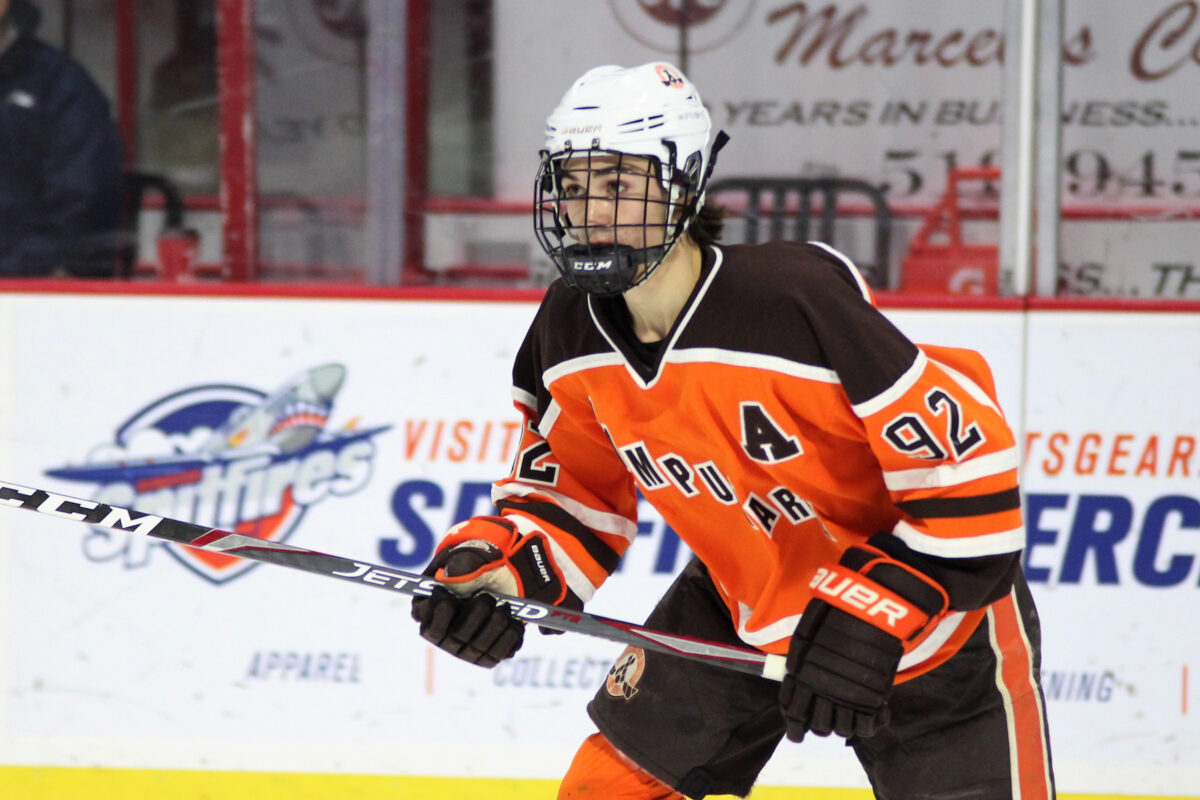
The biggest issue with Hayes is his lack of scoring touch. Unfortunately, it’s not just a finishing issue; he’s missing facets of the offensive game overall. He’s a strong puck retriever but doesn’t drive play or create scoring opportunities for himself or his teammates with real efficiency. This lack of scoring is the big thing holding him back in the rankings. Even if he can’t fix his issues on offense, he’s a perfectly serviceable checking forward who can also play heavy penalty kill minutes.
Round 3 – Pick 87
Cole Spicer
If the Senators decide to target Cutter Gauthier in the first round, they might also want to scoop up his US National Team Development Program (USNTDP) teammate Cole Spicer. He is, like many others in this draft, without a solidified ranking. He plays a straight-laced, two-way game with average skill. His greatest strengths lie in his skating, his hockey IQ, and his willingness to get into the dirty areas despite being a little bit undersized for the role at 5-foot-10. Spicer has committed to the University of Minnesota-Duluth, and it’s worth taking a risk on him as the US college programs have really helped prospect development over the past few years. Should this happen, he could have a higher ceiling than he does now.
Related: 2022 NHL Draft Guide
The USNTDP has been turning out more and more high-quality prospects. With so many highly-touted players, sometimes the cream rises to the top, obfuscating the view below. With high-ranking teammates, it’s possible scouts have undervalued Spicer, and he hasn’t been given a large opportunity to truly drive play. This could be a case of a very good player being overshadowed by a great player. He’s worth the risk.
Ludvig Jansson
If the Senators don’t take a defenseman in the second round, they might consider Ludvig Jansson. He’s spent all of his time in Sweden and was a relatively well-regarded prospect before making the jump out of junior hockey and into an adult league.
Unlike the Swedish Hockey League (SHL), which follows North American style rules, Jansson played in HockeyAllsvenskan, which is a much more European league. On a bad team that faced relegation, he managed to stay at minus-9 over 49 games. Playing against men, with European rules, and in a harder-to-scout league could have affected his draft stock. Selecting him and getting him immediately to the North American farm system could pay off.
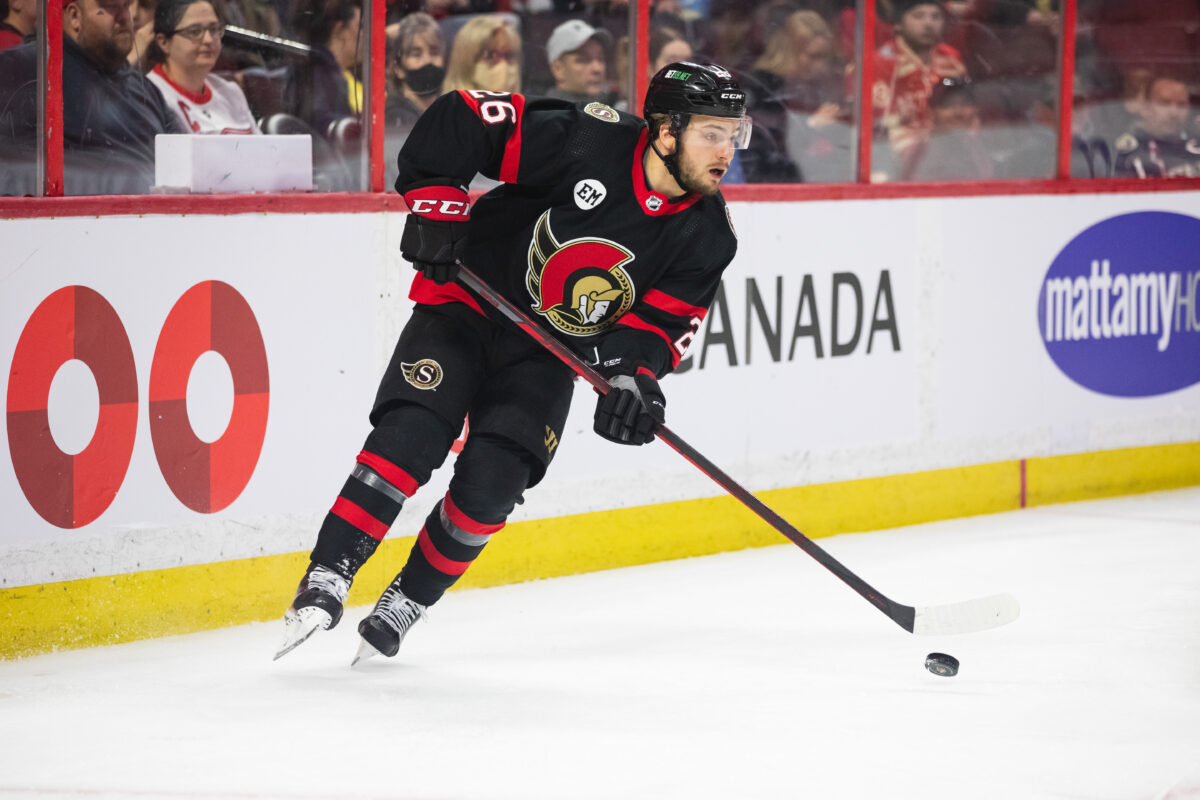
The Senators have no shortage of defensive prospects in their system. This season could be the last for Erik Brännström if he doesn’t take the next step, and Jake Sanderson is ready to dive into the big league. The team has developed a core of puck movers who also exhibit strong defensive play. Jansson fits that mold. This area of development appears to be very strong for the club, and a player who naturally fits in would likely be given all the tools to succeed.
Round 4 – Pick 104
These are the rounds of the draft where anything can happen, and the skill of the scouting staff really comes into play. Any one of the picks here could be a complete miss, destined for minor leagues, or they could be Pavel Datsyuk. The Senators recently promoted their main scout Trent Mann. Formerly the director of scouting, he now serves as the assistant general manager and will continue to have a big say in the drafting decisions.
Markus Vidicek
One option at 104th overall could be Markus Vidicek. Ranked at 110th on Matthew Zator’s final rankings, Vidicek has played the last two seasons with the Halifax Mooseheads of the Quebec Major Junior Hockey League (QMJHL). The is undersized, and the Senators have a history of avoiding low-weight prospects (Tim Stützle notwithstanding) in recent drafts. Vidicek is a strong skater who, despite his weight, plays a very tight-checking, two-way game. He had great success with the Mooseheads and has the raw tools available to progress if he can bulk up without damaging his stride. Alex Formenton is an elite skater who could help him with that training.
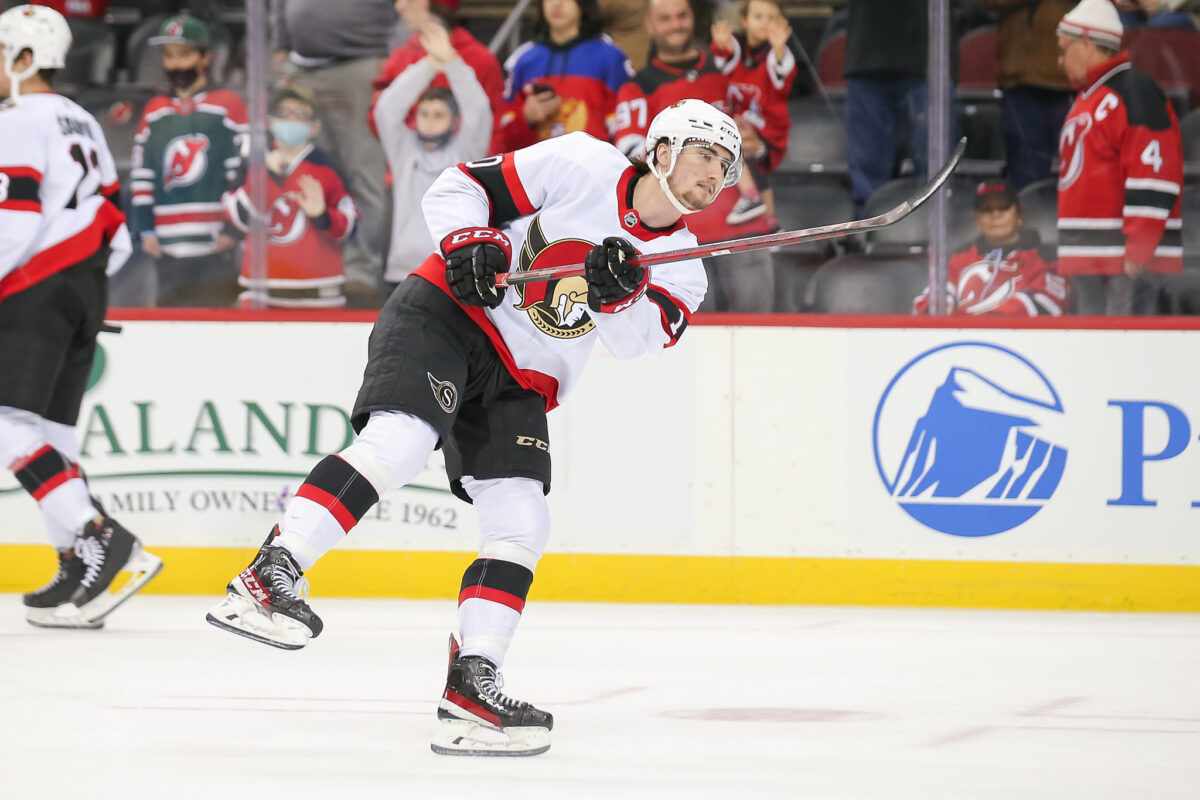
Vidicek is quick and crafty but has found most of his success in the defensive zone. He can cover the net when the defender shifts away to track the puck carrier, and his stick is effective at breaking up plays. Exiting the zone is not his strongest play, but he can make a quick first pass to develop a breakout. On offense, he relies on his speed to set up the play for trailers and could benefit from driving the net more. As he develops and hopefully adds muscle, his offensive zone strategies could change. He picked up nearly a point per game in his second QMJHL season, and, if selected, will benefit from further time in that league before moving to the Belleville Senators.
Lucas Edmonds
An intriguing choice at 104th could be an over-ager. Lucas Edmonds was teammates with potential first-overall pick Shane Wright on the Kingston Frontenacs. Edmonds had previously played in a variety of Swedish leagues with middling numbers at best, but in his first OHL season, Edmonds crushed expectations with a whopping 113 points in 68 games. While the Frontenac’s playoff hopes ended early, he was still a point-per-game player through the first two rounds. He’s been draft-eligible a few times and has gone unselected each time. However, this OHL season has rapidly improved his draft stock.
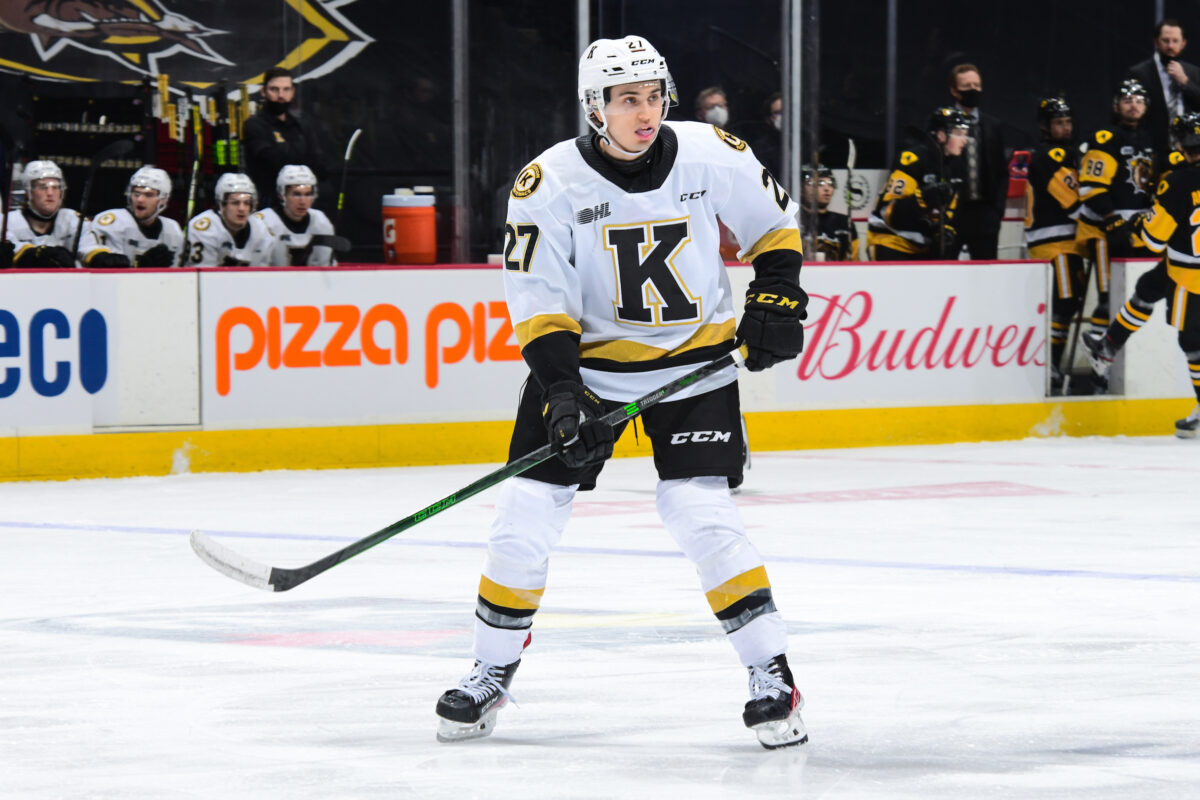
Early draft projections had him closer to 200th, but more recently, he’s been ranked as low as 78th. Recency bias can be very strong with later picks. At 21 years old, it might be difficult to squeeze out further development, and most of his skills are likely set at this age. Edmonds’ biggest weakness is his skating. With a below-average stride and speed, he had a difficult time keeping up with some of the faster OHL players, and he might struggle to keep up in the NHL. But if a team decides to pick him, he has the base skills to be an effective shutdown player on a third or fourth line with the goal-scoring prowess to pick up some points. Far from a superstar, he is the type of player teams need to win championships.
The Senators need a homerun on draft day. Whether it be through strong drafting or a great trade, management has to get this one right. Wrong moves here could spell the end for general manager Pierre Dorion, but there’s nothing wrong with going a little off-board in the middle rounds.